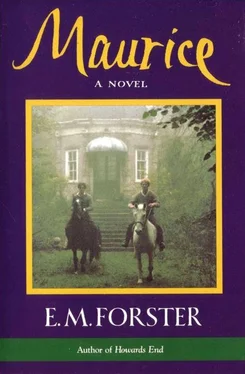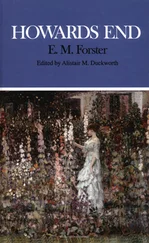"Yes. I'll apologize."
There was a long interval: they discussed the motor bicycle, which had never been heard of again. Clive made coffee.
"Tell me, what made you wake me that night after the Debating Society. Describe."
"I kept on thinking of something to say, and couldn't, so at last I couldn't even think, so I just came."
"Sort of thing you would do."
"Are you ragging?" asked Maurice shyly.
"My God!" There was a silence. "Tell me now about the night I first came up. Why did you make us both so unhappy?"
"I don't know, I say. I can't explain anything. Why did you mislead me with that rotten Plato? I was still in a muddle. A lot of things hadn't joined up in me that since have."
"But hadn't you been getting hold of me for months? Since first you saw me at Risley's, in fact."
"Don't ask me."
"It's a queer business, any way."
"It's that."
Clive laughed delightedly, and wriggled in his chair. "Maurice, the more I think it over the more certain I am that it's you who are the devil."
"Oh, all right."
"I should have gone through life half awake if you'd had the decency to leave me alone. Awake intellectually, yes, and emotionally in a way; but here — " He pointed with his pipe stem to his heart; and both smiled. "Perhaps we woke up one another. I like to think that any way."
"When did you first care about me?"
"Don't ask me," echoed Clive.
"Oh, be a bit serious — well — what was it in me you first cared about?"
"Like really to know?" asked Clive, who was in the mood Maurice adored — half mischievous, half passionate; a mood of supreme affection.
"Yes."
"Well, it was your beauty."
"My what?"
"Beauty… I used to admire that man over the bookcase most."
"I can give points to a picture, I dare say," said Maurice, having glanced at the Michelangelo. "Clive, you're a silly little fool, and since you've brought it up I think you're beautiful, the only beautiful person I've ever seen. I love your voice and everything to do with you, down to your clothes or the room you are sitting in. I adore you."
Clive went crimson. "Sit up straight and let's change the subject," he said, all the folly out of him.
"I didn't mean to annoy you at all —"
"Those things must be said once, or we should never know they were in each other's hearts. I hadn't guessed, not so much at least. You've done all right, Maurice." He did not change the subject but developed it into another that had interested him recently, the precise influence of Desire upon our aesthetic judgements. "Look at that picture, for instance. I love it because, like the painter himself, I love the subject. I don't judge it with eyes of the normal man. There seem two roads for arriving at Beauty — one is in common, and all the world has reached Michelangelo by it, but the other is private to me and a few more. We come to him by both roads. On the other hand Greuze — his subject matter repels me. I can only get to him down one road. The rest of the world finds two."
Maurice did not interrupt: it was all charming nonsense to him.
"These private roads are perhaps a mistake," concluded Clive. "But as long as the human figure is painted they will be taken. Landscape is the only safe subject — or perhaps something geometric, rhythmical, inhuman absolutely. I wonder whether that is what the Mohammedans were up to and old Moses — I've just thought of this. If you introduce the human figure you at once arouse either disgust or desire. Very faintiy sometimes, but it's there. 'Thou shalt not make for thyself any graven image — because one couldn't possibly make it for all other people too. Maurice, shall we rewrite history? 'The Aesthetic Philosophy of the Decalogue. I've always thought it remarkable of God not to have damned you or me in it. I used to put it down to him for righteousness, though now I suspect he was merely ill-informed. Still I might make out a case. Shall I choose it for a Fellowship Dissertation?"
"I can't follow, you know," said Maurice, a little ashamed.
And their love scene drew out, having the inestimable gain of a new language. No tradition overawed the boys. No convention settled what was poetic, what absurd. They were concerned with a passion that few English minds have admitted, and so created untrammelled. Something of exquisite beauty arose in the mind of each at last, something unforgettable and eternal, but built of the humblest scraps of speech and from the simplest emotions.
"I say, will you kiss me?" asked Maurice, when the sparrows woke in the eaves above them, and far out in the woods the ringdoves began to coo.
Clive shook his head, and smiling they parted, having established perfection in their lives, at all events for a time.
17
It seems strange that Maurice should have won any respect from the Durham family, but they did not dislike him. They only disliked people who wanted to know them well — it was a positive mania — and the rumour that a man wished to enter county society was a sufficient reason for excluding him from it. Inside (region of high interchange and dignified movements that meant nothing) were to be found several who, like Mr Hall, neither loved their fate nor feared it, and would depart without a sigh if necessary. The Durhams felt they were conferring a favour on him by treating him as one of themselves, yet were pleased he should take it as a matter of course, gratitude being mysteriously connected in their minds with ill breeding.
Wanting only his food and his friend, Maurice did not observe he was a success, and was surprised when the old lady claimed him for a talk towards the end of his visit. She had questioned him about his family and discovered the riakedness thereof, but this time her manner was deferential: she wanted his opinion of Clive.
"Mr Hall, we wish you to help us: Clive thinks so much of you. Do you consider it wise for him to stop up a fourth year at Cambridge?"
Maurice was wanting to wonder which horse he should ride in the afternoon: he only half attended, which gave an appearance of profundity.
"After the deplorable exhibition he has made of himself in the Tripos — is it wise?"
"He means to," said Maurice.
Mrs Durham nodded. "There you have gone to the root of the matter. Clive means to. Well, he is his own master. This place is his. Did he tell you?"
"No."
"Oh, Penge is his absolutely, under my husband's will. I must move to the dower house as soon as he marries —"
Maurice started; she looked at him and saw that he had coloured. "So there is some girl," she thought. Neglecting the point for a moment, she returned to Cambridge, and observed how little a fourth year would profit a "yokel" — she used the word with gay assurance — and how desirable it was that Clive should take his place in the countryside. There was the game, there were his tenants, there were finally politics. "His father represented the division, as you doubtless know."
"No."
"What does he talk to you about?" she laughed. "Anyhow, my husband was a member for seven years, and though a Lib is in now, one knows that cannot last. All our old friends are looking to him. But he must take his place, he must fit himself, and what on earth is the good of all this — I forget what — advanced work. He ought to spend the year travelling instead. He must go to America and if possible the Colonies. It has become absolutely indispensable."
"He speaks of travelling after Cambridge. He wants me to
"I trust you will — but not Greece, Mr Hall. That is travelling for play. Do dissuade him from Italy and Greece."
"I'd prefer America myself."
"Naturally — anyone sensible would; but he's a student — a dreamer — Pippa says he writes verse. Have you seen any?"
Читать дальше












